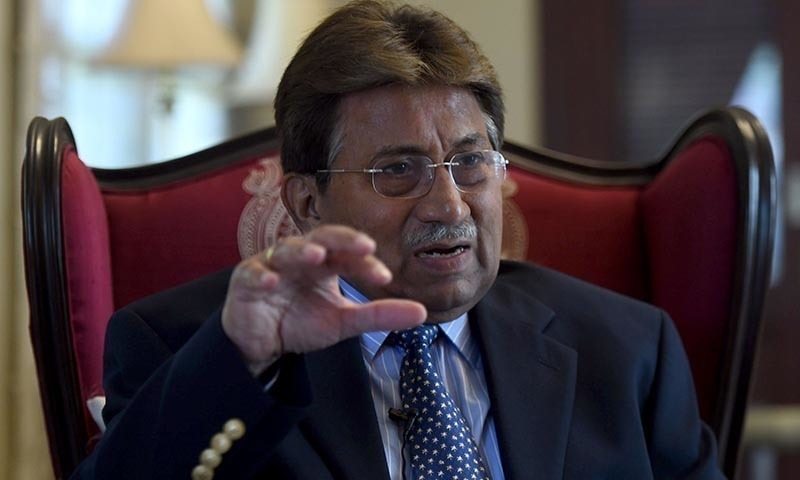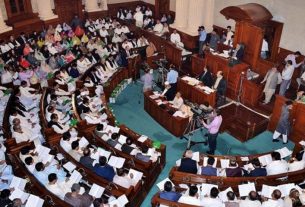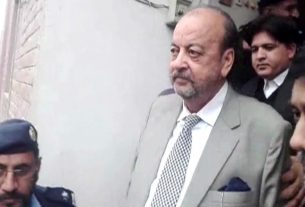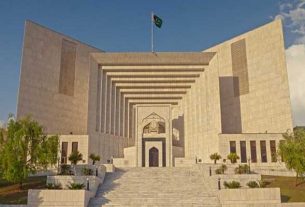The Lahore High Court on Monday declared the formation of a special court — which heard the treason case against former dictator Pervez Musharraf and handed him a death sentence after finding him guilty of treason — as “unconstitutional”.
The LHC bench, which was hearing Musharraf’s petitions against the verdict, also ruled that the treason case against the former president was not prepared in accordance with the law. A short order of the high court will be released shortly.
A three-member full bench of the LHC, comprising Justice Syed Mazahar Ali Akbar Naqvi, Justice Mohammad Ameer Bhatti and Justice Chaudhry Masood Jahangir, delivered the unanimous verdict.
Musharraf was sentenced to death by a special court in Islamabad on December 17, 2019, six years after the trial started. The case was filed by the PML-N government against Musharraf for suspending the Constitution on November 3, 2007, when he imposed emergency in the country.
According to both the federal government and Musharraf’s lawyer, after the high court’s ruling, the verdict issued by the special court stands voids.
In his petitions following the damning verdict, Musharraf had asked the LHC to set aside the special court’s verdict for being illegal, without jurisdiction and unconstitutional for violating Articles 10-A, 4, 5, 10 and 10-A of the Constitution. He also sought suspension of the verdict till a decision on his petition is made.
The former military chief is currently in Dubai in the United Arab Emirates. He was admitted to a hospital following deterioration of his health last month.
Arguments in court
As the court resumed hearing Musharraf’s pleas on Monday morning, Additional Attorney General (AAG) Ishtiaq A. Khan, appearing on behalf of the federal government, presented the summary and record of the formation of the special court.
On Friday, Justice Naqvi had asked the federal government to submit a summary on the formation of the special court and had directed the state’s lawyer to present arguments on Monday (today).
AAG Khan said that the matter of forming a case against Musharraf was never included in the cabinet agenda.
Justice Jahangir asked when the cabinet meeting under discussion was held. AAG Khan responded that it was held on June 24, 2013. He added that the cabinet met again with regards to the appointment of judges for the special court.
“It is the truth that the formation of the special court to hear the case against Musharraf was done without cabinet approval,” he said.
According to the additional attorney general, the appointment of one of the judges in the special court had come under discussion in the cabinet on May 8, 2018. He added that on October 21, 2018, Justice Yawar Ali had retired and the special court was again broken.
The court inquired if the matter of the process of filing a complaint in the case had come up in cabinet meetings. AAG Khan responded in the negative.
“According to your record, there is no agenda or notification regarding the formation of the special court or the filing of the complaint,” the bench noted.
The bench also discussed if imposing an emergency amounted to the suspension of the Constitution and Justice Naqvi remarked that “emergency is part of the Constitution”.
“If the situation is such that the government imposes an emergency, will a treason case be filed against that government as well?” asked Justice Naqvi.
“Can an emergency be imposed under Article 232?” asked Justice Bhatti. The additional attorney general conceded that such a step would be in accordance with the Constitution.
“Then how is it a deviation from the Constitution?” asked Justice Naqvi. The AAG told the court that while passing the 18th Amendment, the parliament had included the suspension of the Constitution in Article 6 as an offence.
The bench asked if a person can be punished for an offence committed before an amendment is passed in that regard.
“An offence committed in the past cannot be punished after new legislation,” the federal government’s counsel told the court.
Justice Naqvi further said that by adding three words, the parliament had changed the entire status of the Constitution. He was referring to the amendments made in Article 6, where the parliament had deemed the abrogation, subverting or suspension of the Constitution as an offence of high treason.
“How many members comprised the FIA team that conducted the inquiry against Perves Musharraf?” asked Justice Naqvi, as the court examined the proceedings of the trial against Musharraf.
“A 20-25 member team was constituted which completed the inquiry,” the AAG told the court.
“How many of those members participated in the trial?” the judge asked.
“Only one of them appeared [before the special court] for the trial,” said AAG Khan.
“What is the value of an inquiry against Pervez Musharraf when those who conducted the inquiry did not appear during the trial [proceedings]?” remarked the judge.
Musharraf case was not on cabinet agenda
During the hearing on Friday, the LHC had posed questions regarding the legality of the treason case and the formation of the special court that conducted the trial and had handed Musharraf the death sentence.
Barrister Ali Zafar, who has been appointed the court’s amicus curea, said that the case against Musharraf seemed to have been filed on the behest of then prime minister Nawaz Sharif, as there is no record of the matter being on the agenda of any of the cabinet meetings held at the time.
“A case under Article 6 cannot be filed without the cabinet’s approval,” Barrister Zafar had insisted. The court asked if the matter was on the agenda of any cabinet meeting, to which Zafar had responded in the negative.
“None of the cabinet meetings were held on the matter,” Barrister Zafar said.
“This was history’s most important matter; can the cabinet discuss it without it being an agenda item?” the bench had asked.
In an earlier hearing on Musharraf’s plea, AAG Ishtiaq A Khan on Thursday told the bench that the formation of the special trial court had not been approved by the federal cabinet.
He said the record showed that only one letter was written by then premier Nawaz to the ministry of interior for the initiation of an inquiry against Musharraf on the charge of high treason.



